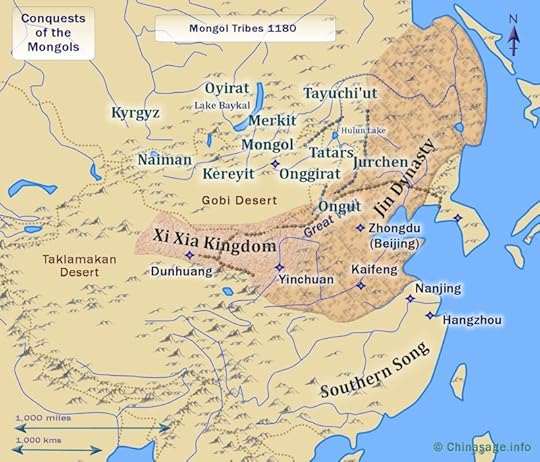The 1215 Mongol Conquest of Beijing

Episode 18 The Battle of Beijing
1215: Years That Changed History
Dr Dorsey Armstrong (2019)
Film Review
The great Mongol warrior Tamugen (aka Genghis Khan) conquered and amalgamated not only warring Mongol tribes but also the Uighurs, Turks, Huns and other steppes nomads into the Mongol Empire, the largest the world has ever known. Tamugen himself referred to it as the People of Felt Walls (referring to the felt ghers they lived in).
Armstrong attributes his success to his
insistence on total freedom of religion,total ban on looting (after battle) until there was clear and decisive victory*distribution of booty equally among all his followers (and their widows and families).organization his warriors into decentralized administrative units of 10, 100 and 1000 troops.lack of foot soldiers or supply trains to slow the onslaught of his mounted warriors. His army survived mainly on yak’s milk, the occasional slaughter of an animal for meat and hunting.recruitment of Chinese engineers to build siege technology and help him divert the Yellow River to drown opposing armies.ingenious use of spies and agents provocateurs.The 1215 Battle Zhongdu (Beijing)
When Genghis Khan conquered Beijing in 1215, China was divided into warring Song, Tangut (Xia Xi) and Jurchen Jin kingdoms. He made the decision in 1210 to attack the Jurchen capitol Zhongdu when the Jurchen emperor sent an envoy to him demanding that he pay tribute. Tamugen first allied himself with the Tangut (in modern day Tibet) and the Khitans in eastern inner Mongolia so could move his forces through their territories.
As his warriors sacked the rural Jurchen provinces, they created a flood of refugees seeking shelter in the walled city of Zhongdu. As the capitol ran out of food and began turning refugees away, many defected to join the invading forces. In fact, many Jurchen peasants (and even Jurchen generals) eagerly welcomed Genghis Khan, believing he had the mandate of heaven.
Crippled by the Mongol siege on his capitol, the emperor Xuanzong agreed in 1214 for Jurchen Jin to become a Mongol vassal state, offering Genghisi Khan tools, jewels, silk and his daughter in marriage. Accordingly, Genghis Khan withdrew his forces and returned to Mongolia.
When Xuanzong reneged on his promises, Genghis Khan and his forces returned, forcing the Jurchen emperor to flee south (where he established a new capitol in Keifind) and leave his Zhongdu undefended.
The conquest of Zhongdu resulted in a continuous transfer of bronze, iron, silk, jade, gold and silver to Mongols remaining on the steppes, promoting a major step change in their nomadic ways.
*His rivals allowed looting before enemy forces had surrendered, exposing their warriors to counterattack.
**See China’s Mandate of Heaven: The Right to Overthrow Morally Unfit Rulers
Film can be viewed free with a library card on Kanopy.
https://www.kanopy.com/en/pukeariki/watch/video/12392969/12393006
The Most Revolutionary Act
- Stuart Jeanne Bramhall's profile
- 11 followers



